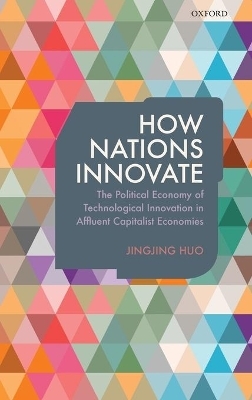
How Nations Innovate
Oxford University Press (Verlag)
978-0-19-873584-7 (ISBN)
How Nations Innovate compares how affluent capitalist economies differ in their patterns of technological innovation. Building on the 'varieties of capitalism' literature, this book goes beyond the traditional focus on 'radical versus incremental innovation' in existing scholarship, and takes the comparison of capitalism to an entirely new set of questions around technological innovation. For example, which type of capitalism engages in job-threatening innovation? Whose innovation widens income inequality? Whose innovation raises productivity? Which type of capitalism has more effective financial markets for innovation? Whose innovators emphasize 'control' rather than 'flexibility' during innovation?
By addressing these questions, the author demonstrates that the way nations innovate often has deep, and sometimes counter-intuitive, implications for how they compare in many areas of socio-economic performance. For example, although venture capital is most active in Anglo-Saxon economies, it seems that venture-capital performance in stimulating innovation is also poorest in precisely these countries. On the issue of employment, the author argues that, whilst technological innovation in Anglo-Saxon economies creates jobs, innovation in European economies destroys jobs. Nations also differ in the nature of income inequality driven by innovation. While innovation pushes top earners further ahead of median earners in Anglo-Saxon economies, it drags bottom earners further behind the median in European economies. Finally, varieties of capitalism also differ in their ability to cope with the volatilities of innovation. While Anglo-Saxon economies face a trade-off between low volatility and high innovation output, these two goals seem jointly achievable in European economies.
Jingjing Huo is an Associate Professor at the Department of Political Science, University of Waterloo. He obtained his PhD in Political Science from the University of North Carolina Chapel Hill. His research focuses on the political economy of advanced industrialized countries, especially technological innovation and labor market policies. He has published a book with Cambridge University Press (2009) on labor market policies in advanced industrialized countries, as well as various articles on technological innovation and social policies, in journals such as Comparative Political Studies, Socio-Economic Review, and Journal of European Social Policy.
1. Introduction ; 2. Who Are Better Hunters for Innovation? ; 3. Whose Innovation Creates More Jobs? ; 4. Whose Innovation Creates More Inequality? ; 5. Who Faces a Dilemma between Volatility and Output in Innovation? ; 6. Conclusion
| Verlagsort | Oxford |
|---|---|
| Sprache | englisch |
| Maße | 163 x 238 mm |
| Gewicht | 578 g |
| Themenwelt | Naturwissenschaften |
| Sozialwissenschaften ► Politik / Verwaltung ► Politische Theorie | |
| Sozialwissenschaften ► Politik / Verwaltung ► Vergleichende Politikwissenschaften | |
| Wirtschaft ► Betriebswirtschaft / Management ► Unternehmensführung / Management | |
| Wirtschaft ► Volkswirtschaftslehre ► Wirtschaftspolitik | |
| ISBN-10 | 0-19-873584-7 / 0198735847 |
| ISBN-13 | 978-0-19-873584-7 / 9780198735847 |
| Zustand | Neuware |
| Haben Sie eine Frage zum Produkt? |
aus dem Bereich


